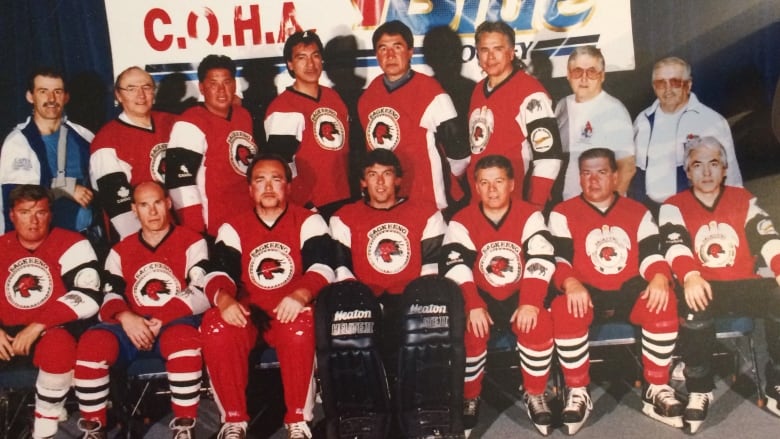Team made up of residential school survivors recognized by Hockey Hall of Fame
Sagkeeng Oldtimers team started in 1978 and competed around the world

A special collection of artifacts from a northern Manitoba hockey team made up of residential school survivors is headed to the Hockey Hall of Fame Museum in Toronto.
The items — including jerseys, banners and special memorabilia — from the Sagkeeng Oldtimers team are being donated by Darlene Ahmo, the daughter of team founder Walter Fontaine and manager Verna Fontaine.
"They had a dream of doing something really special for their lives and for the lives of other survivors. They had a lot of dedication, hard work and they made a lot of sacrifices," Ahmo said.
"They really accomplished a lot."
- Teemu Selanne leads 2017 Hockey Hall of Fame inductees
- How hockey offered salvation at Indian residential schools
The team was formed in 1978 by Ahmo's parents, who both spent about nine years in residential school.

"They wanted to do something really special, I guess, in terms of dealing with what happened to them in residential school because that was huge," she said.
"They never really wanted to talk about it personally, but they wanted to do something for themselves that would help them overcome in trying to deal with what they had gone through."
The team was made up of players from the Sagkeeng First Nation, a community 100 kilometres northeast of Winnipeg, ranging in age from 35 to over 50. Most of the players were also residential school survivors.
Hockey was a way to bring the community members, particularly the survivors, together. But they also started building a reputation for their skills on the ice.
The team played in tournaments across Canada and the United States as well as in Denmark, Germany, England and France.
The team holds titles in the 1987 World Cup, 1989 World Cup in Munich and in the 1987 Canadian National Cup.
The Fontaines led the fundraising and organization of the team and Ahmo said she learned a lot from her parents' dedication.
"I saw, over the years, all the hard work and what my parents did and [how they] wanted to do something really positive," she said, holding back tears.
"I saw how they managed and how they worked, and it taught me a lot of values and left a lot of good things for me. It's kind of overwhelming. It's good, it's really good."
Both of her parents have since passed away, but Ahmo said their story found its way to the hall of fame through the Truth and Reconciliation Commission.
During the Edmonton TRC hearing in 2014, Ahmo's cousin, Theodore Fontaine, spoke about how the team and hockey helped his family and community find healing. He also donated some of the hockey team's artifacts to the commission.

Ahmo said someone from the Hockey Hall of Fame heard the story and reached out, wanting to find out more information about the team.
It wasn't until this summer that Ahmo learned her parents' legacy and community's team would actually go into the hall of fame. She said it means a lot to her family, but it's also important for the history of the sport.
She is particularly excited to include the Sagkeeng Oldtimers crest, which was designed by Ojibway artist Joe Land and represents the free spirit and resilience of the players and their supporters.
She will be delivering the artifacts personally.
"They came to play with good hearts," she said.
With files from Danelle Cloutier